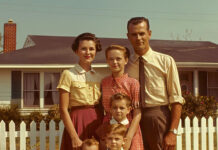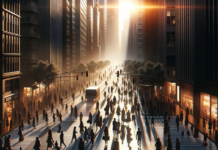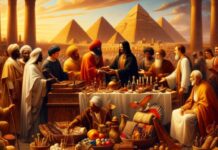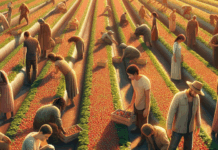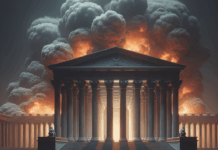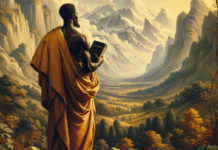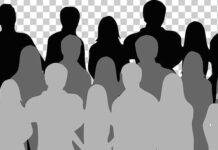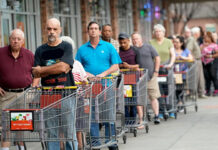This theory attempts to prove that society does not need capitalism and that man is a freeborn, self-employed entity capable of producing goods into society for the needs of humanity without the need of a complex organized overseer such as corporations with CEOs. Capitalism, in itself, is the manifestation of an individual, self-serving interest of one person, or small group of people, doing little to no work but taking credit for everything getting done, at the same time ending up with the most of everything produced into society. While those who actually do the work get the bare minimum of necessities needed to survive.
Take for instance the following scenario; of a man and a woman who has two kids and are the only inhabitants of the earth. They all need food, water, clothes and shelter. The man is driven by his hunger and human nature to go out and get food. The woman, by her nature, will stay near the children who need protection and guidance. The man routinely brings food to his family daily because they all need food for survival. The reason the man goes out instead of the woman is because there are snakes and spiders in the woods.
One day while hunting for food, the man sees another man doing the same thing. The other man is in the same situation as him, he has a woman and two children to feed. Soon after a few times of seeing each other hunting, they decide to get together and make a plan. One man would hunt, the other would clean the animal, skin it for coats, and carve it for meat.
The women mend and clean the coats, cook the meat and clothe and feed the children, setting aside food for the men for later. As time passed, the two men found two other men and a third one, all in the same situation. The five of them formed a plan to make things easier for them all. Two of the men hunted, two skinned the animals, and the last man carved the meat. The women would come and get the meat, cook it and feed the children.
At this point in time, all the men were self-employed; neither needed supervision of the other, they each had their own job to do and neither family had more than the other. As the children grew, the older sons would go out and explore the land. One day they ran across a group of another five families on the other side of the mountain who were doing the exact same thing, surviving off the land. However, these people were growing food from the ground instead of hunting for wild life.
When the two groups got together, they traded among themselves and the community grew into a meat and plant-based food consuming group. With ten men now working for the group, they assigned two men to begin building huts instead of living in the caves of the rocks. One of the men knew how to cut trees and form them into slats for walls of the huts and the other man tied them together. This was their contribution to the entire group, and they each received food and clothing for their labor.
The other men continued with their jobs as hunters, butchers, coat makers, farmers and builders. This collective association of people needed no supervision, overseer, or employer to build what was now a small thriving society. Each of the families had what they needed to survive and as the children grew, they fell into place in their job placement.
One day, one of the men went missing. He had not been seen in a few days so someone went to find him, and he was found hiding in his hut. When the others saw what he had in his possession, it confused them and the discovery changed the way this small society started to think. The man had triple the amount of food and clothes as the others.
One of the men asked him where did he get these things and why did he have them. How did he come to gather these things without the knowledge of the others and what was his plan for all the goods he had? What was his answer? Please comment with a theory as to what this man was thinking and doing so we can complete this study.
Our Theory
This man disassociated himself from the group after he stood back one day and watched the progression of this society and thought to himself; how he could benefit from it and continue to get food and clothing without having to do any work. The conclusion he came to was to a) steal it from another family, b) pay someone else to steal it, or c) ration the food and clothing to his family and save the rest. What other reason would he have so many more goods than the others?
DISCLAIMER: The content of Pro Liberation is firmly opinionated and is not meant to be interpreted as official news. We glean facts and quotes from mainstream news websites and abridge its meaning for readers to relate. We do not indulge in misinformation, conspiracy theories, or false doctrine but choose to express our right to free speech as citizens of this country and free born under God the Creator. We represent Nu Life Alliance Inc. a non-profit organization in the battle for social and economic justice. Donate to our cause at the following link. DONATE



